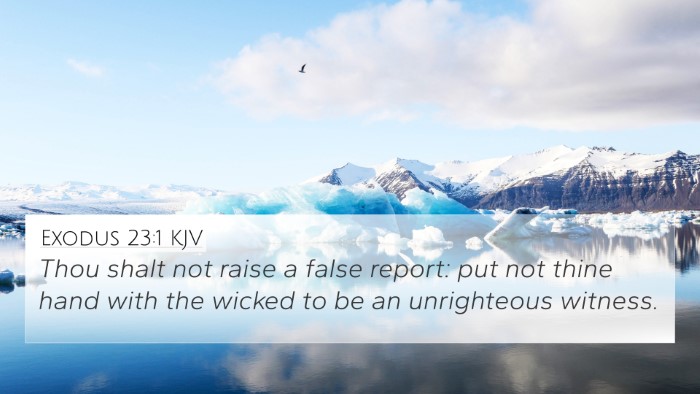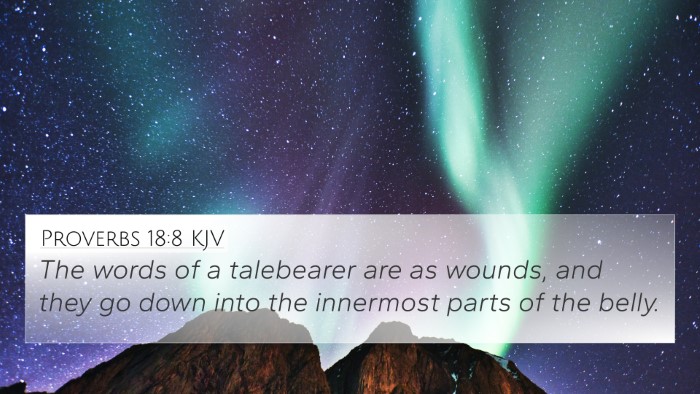Understanding Deuteronomy 22:14
Verse: "And give occasions of speech against her, and bring up an evil name upon her, and say, I took this woman, and when I came to her, I found her not a maid."
General Overview
The verse is part of the Mosaic Law, which aimed to maintain moral integrity within the Israelite community. It addresses the serious accusation of a wife being unchaste at the time of marriage. This legal framework was intended to protect the rights and dignity of women while underlining the importance of fidelity.
Commentary Insights
Matthew Henry: Henry emphasizes that this law reflects God's concern for justice and the honor of marital relationships. The accusation was significant and could damage a woman’s reputation irreparably. He notes the importance of proper evidence and testimony before making such damning claims.
Albert Barnes: Barnes stresses that the principle behind this verse is to curb slander and false accusations. He highlights that within such societal structures, the weight of reputable witnesses is essential, and the integrity of marriage should be fervently protected.
Adam Clarke: Clarke explains that the accusation a husband could make reflects ancient customs regarding marriage and womanhood. Clarke points out the harsh implications of this pronouncement without substantial proof of the woman’s prior conduct. Such measures were fundamentally rooted in maintaining social and familial harmony.
Thematic Connections
This verse connects with broader themes of integrity in relationships, the significance of truthfulness, and the protection of individual rights under law. It opens discussions about how accusations can forge lasting consequences not only for individuals but also for families and communities.
Cross-References
- Deuteronomy 24:1-4: Discusses the regulations surrounding divorce and the conditions under which a woman could be sent away.
- Exodus 22:16-17: Addresses seduction and the resulting responsibilities and consequences for both parties.
- Leviticus 20:10: Specifies penalties for adultery, underscoring the severity of marital unfaithfulness.
- Proverbs 6:32: Offers wisdom about the folly of infidelity and highlights the destructive nature of betrayal.
- Matthew 1:19: Reflects Joseph's initial reaction to Mary’s unexpected pregnancy, showcasing the weight of public perception in marital fidelity.
- John 8:4-5: Illustrates the Pharisee’s questioning of Jesus regarding a woman caught in adultery, highlighting societal judgments about women's chastity.
- 1 Timothy 5:19: Advises on how to address accusations against elders, indicating the importance of credible testimony in all matters.
- James 4:11-12: Warns against speaking evil of one another, drawing a moral parallel to the criticisms outlined in Deuteronomy 22:14.
- 1 Peter 2:12: Encourages Christians to maintain good conduct among the Gentiles to silence accusations against them.
- Ephesians 4:29: Calls for wholesome communication and caution against harmful speech, emphasizing the responsibility of words.
Conclusions and Reflections
Deuteronomy 22:14 profoundly encapsulates the importance of maintaining not only personal integrity but also social justice within marriage. The implications of misrepresented truth can echo through generations. Through cross-referencing this verse with related scriptures, a deeper understanding of the sanctity of marriage and the value of trust can be achieved.
Using Cross-Referencing for Deeper Insights
The art of cross-referencing Biblical texts aids in constructing a holistic view of a theme or doctrine, providing insights that are woven throughout Scripture. Here are a few tools and techniques to explore:
- Utilize a Bible concordance for thematic studies.
- Employ a cross-reference Bible study guide to navigate complex passages.
- Engage in a comprehensive Bible cross-reference strategy when preparing sermons.
- Study the links between the Old and New Testament for broader thematic understanding.
Further Studies
For anyone interested in Bible study, understanding how to identify connections between Bible verses becomes crucial. Exploring these connections not only enriches personal faith but cultivates a greater appreciation for the transformative message of Scripture.








